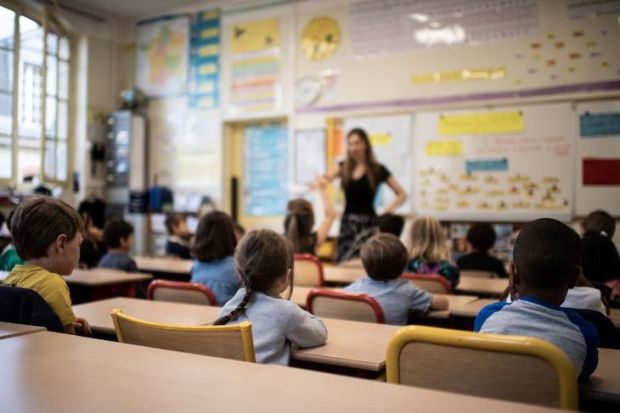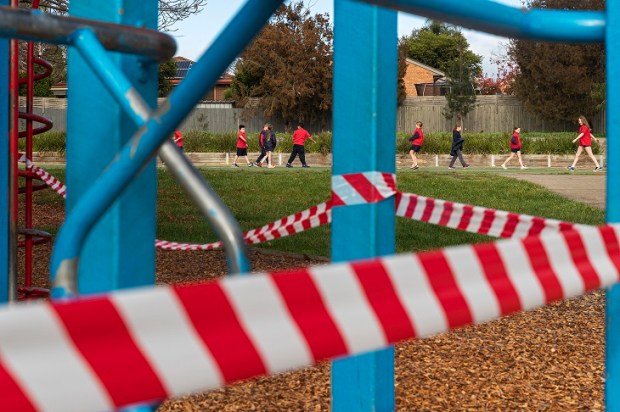Parents are concerned, teachers are stressed, and the kids are anxious. These issues are regularly discussed within schools and throughout the wider community – and that is before we consider the spiralling decline in education standards and student academic performance.
A report by the Institute of Public Affairs concluded that the current cohort of students were nearly 1 and a half years behind their peers from the year 2000 in mathematics. This result is not an outlier.
I deal with internal observations and solutions to this situation in an earlier Spectator Australia article. The subject of this article is the response of our education leaders and how we can help.
What has been the governmental response?
The obvious course of action following a significant and sustained event like a lockdown would be to focus on minimising change and maximising opportunities for teachers to dedicate their time to learning and developmental gaps created by the disruption whilst providing a stable working environment.
Indeed, in ‘March 2023, the NSW government committed to reducing teachers’ administrative workload by at least five hours per week’. It is now 2025, and it is evident that the reverse is the case with the NSW Department of Education changing the syllabus of every school year since 2020, creating a massive amount of work rewriting programs. No cost-benefit analysis has been published making the justification difficult to comprehend. It certainly isn’t designed to improve academic performance which has plummeted at a rate unseen in my lifetime. Perhaps the purpose is to create the illusion of progress while keeping teachers too busy to see what is really taking place?
Further, Naplan testing recently changed and, according to the Australian Curriculum and Reporting Authority (ACARA) ‘you can’t compare Naplan achievement prior to 2022 to that from 2023 onwards’. This removes a significant tool which may have otherwise been used to discover the impact of the lockdown years and highlight areas requiring attention. Some might argue that this loss of a baseline comparison is somewhat fortunate for the government and education departments…
Exploring Naplan tests is also quite revealing.
Take the following Year 6 content descriptor from ACARA: ACMNA123 ‘… solve problems involving all four operations with whole numbers.’ It appears in the Year 9 Naplan test classed as the second highest proficiency level of Strong, which is defined as, ‘The student’s result met challenging but reasonable expectations at the time of testing.’ Indeed, a student may be strong but a correct answer to a Year 6 question cannot determine this and an incorrect answer would indicate the student needs additional support.
It is evident that the Naplan results are not giving parents, teachers, and school administrators an accurate picture of the current situation but it also creates a perverse incentive. If the tests show students are doing well, parents are pleasantly surprised and schools, teachers, and parents can claim success, but what if the reality is different from the narrative? What is the incentive to tell the truth and who would want to know anyway?
While the rest of us were working or trying to keep families together, our taxes were going to fund work of questionable benefit within our bureaucratic organisations. One such document is titled, Trans@School produced by the Queensland Human Rights Commission and published in 2020. Actually, they produced two documents, one targeting schools and the other students. In these documents they refer to:
‘Affirming gender means affirming the gender that matches a person’s gender identity. For example, if a person was assigned male at birth and identifies as female, the person affirms their gender as female.’
The documents then go on to instruct children on how to successfully change their gender identity and how the school should support them in this process, even if parents disagree – affirmation must come first. Sky News Australia reported in May, 2024 that, ‘Data from the Australian Curriculum, Assessment and Reporting Authority (ACARA) revealed 2,560 students enrolled as non-binary in 2023 – up 20 times from the 128 non-binary students in 2019.’ These figures imply that the rates at which this is happening is unlikely to be organic.
In acknowledging the added burdens and responsibilities on teachers, unions might be expected to advocate for balanced working conditions or streamlined execution of tasks or staff wellbeing, but this does not appear to be the case. The New York Post reported in June 2025, ‘Australian teachers union urges educators to use “gender-neutral” terms in the classroom.’ Hardly something which will improve learning outcomes or help the job of teaching but may indicate their educational priorities.
To further illustrate the complexity of what has evolved with schooling, I refer to the following submission from a teacher to the Sydney Morning Herald Inquiry into school closures in 2024.
Matt wrote, ‘From a teacher’s point of view, what Covid school closures exposed was just how little many parents care about their children’s education. We sent homework, we sent home instructions, we did Zoom meetings, we used Google Classroom, we rang home, we sent emails … and that’s just the tip of the iceberg. Yet large numbers of students took it as a 6-week bonus holiday and did nothing – all with their parents’ direct approval or the signal from their apathy.’
He is expressing the feelings of many teachers which can be summarised as something like, ‘I am a dedicated teacher and have put all this extra work in to help students and they don’t care enough to just turn up to the online classes.’ This emotion is understandable but misses the appreciation of what parents and kids are experiencing. During the lockdowns I spent countless hours on the phone, early in the morning and late at night, and was privileged to have families share their concerns and feelings. I believe understanding brings a fuller perspective and is the starting point to creating solutions to newly evolving challenges.
In the same series, Jenny Donovan, chief executive of NSW Catholic Schools wrote, ‘Children forgot how to behave. Those getting expelled from school or who are violent, that’s a rarer and bigger issue. I think there needs to be a bit of a reset about the tolerance for low-level disruption … it was acceptable at home, you can be distracted, you can have your music on while online, but you can’t do that at school. It’s fantastic that phones have been banned, and there probably needs to be more explicit language used about appropriate behaviours inside the classroom. I suspect there’s been a drift from that.’
Frankly, I find this response lacking in empathy and considered thought. These are the executives who have the privilege of leading academic learning and whose decisions have a significant influence on childhood development. It is my opinion that some of them failed to defend the children in their care during lockdowns and allowed a destructive narrative of fear to fester. The result is entirely predictable and rather than take responsibility, we hear complaints about the consequences.
The real pandemic today is an absence of leadership focusing on the core responsibility of educating the next generation with the virtues and skills required to function and thrive in Australian society. It is why I invest time and resources in organisations like Australians for Science and Freedom (ASF), as they seek to provide a place to help improve institutions to embed respect for freedom and scientific approaches for society’s problems. It is my hope that as many people as possible take an active interest in our imperfect, but wonderful, country. If we don’t, my deep concern can be summarised by the words of philosopher Joseph de Maistre, ‘Every nation gets the government it deserves.’ Our next generation deserves better and I, for one, will not settle for anything less than a brighter future for them.
Jason Strecker has over 30 years experience in education and IT. He is a co-director for Australians for Science and Freedom (ASF) which seeks to provide a place to help build a healthier, stronger country by embedding respect for freedom and scientific approaches for society’s problems. He can be contacted on X: @JasonStrecker or ASF on jason.strecker@scienceandfreedom.org

























